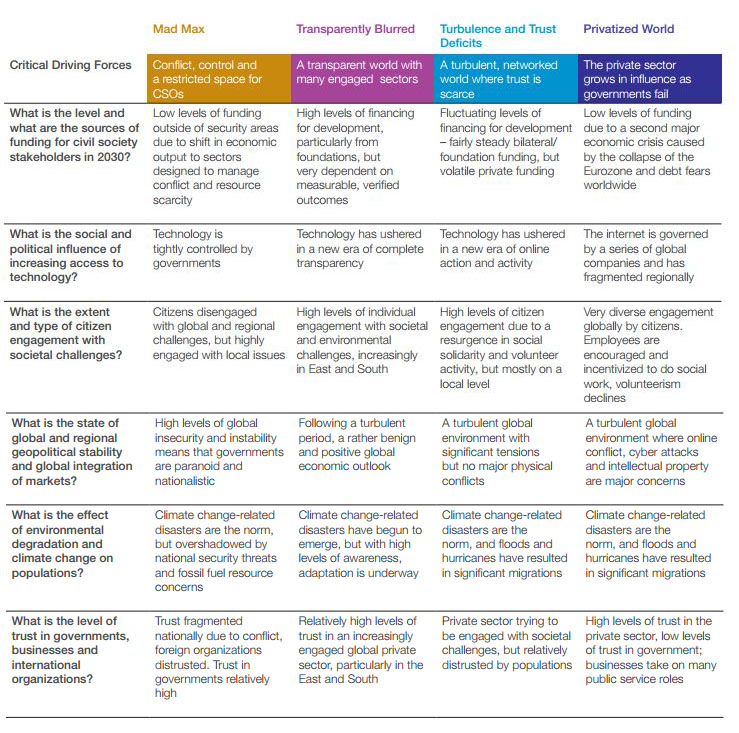4 scenarios for the future of civil society
Nicholas Davis
Professor of Practice, Thunderbird School of Global Management and Visiting Professor in Cybersecurity, UCL Department of Science, Technology, Engineering and Public PolicyStay up to date:
agenda-in-focus-civil-society
Through extensive expert and stakeholder consultation detailed in the World Economic Forum’s report, The Future Role of Civil Society, six critical driving forces that might significantly reshape the future context of civil society have been identified:
− The level and sources of funding for civil society stakeholders
− The social and political influence of increasing access to technology
− The extent and type of citizen engagement with societal challenges
− The state of global and regional geopolitical stability and global integration of markets
− The effect of environmental degradation and climate change on populations
− The level of trust in governments, businesses and international organizations
As the context in which civil society operates shifts, it is useful to reflect on how these forces will help to reshape relations between civil society, business and governments, examine who will take on a greater role in addressing societal changes and consider their relationship with the other stakeholders. Two questions arise in particular:
1. Under what circumstances will business take on a greater role in addressing societal challenges?
At one extreme, the private sector may by 2030 have proven itself a highly efficient and effective champion of societal challenges, applying significant human and financial resources and pioneering new models to create measurable impact across a number of domains. Alternatively, by that point the business community could be disengaged, distracted by other issues around corporate survival, or excluded in other ways.
2. Under what circumstances will governments take on a greater role in addressing societal challenges?
In 2030, national governments may be highly successful at tackling societal challenges, taking indications of success in environment and social development and institutionalising them in the public sector. Governments may also, under economic stress, disengage from providing public goods, leaving civil society to fill the gaps. Finally, in the context of conflict, governments may restrict civil society activity all together.
Four Challenging Scenarios
As the critical uncertainties illustrate, civil society might in the future operate in a significantly different context from that of the present. As leaders reflect upon their strategies and their relationships with other stakeholders; the content below is important to consider. Four scenarios have been discussed:
Mad Max is a world characterized by international and national conflict, where governments exert strong security controls on both business and society. Levels of funding for societal and development challenges are limited.
Transparently Blurred posits a scenario where economic growth is relatively high over the period 2020-2030 and where the government and private sector are both deeply engaged in tackling societal challenges. Access to data, technology and rigorous monitoring are the hallmarks of a revolution in both economic activity and social development.
Turbulence and Trust Deficits depicts a chaotic world where trust is a scarce commodity. Yet, thanks to the possibilities created by the rise of the networked society, there is a significant latent desire for social engagement by citizens, particularly at the local level.
Privatized World is one where many governments are seen to have failed, inequality is extreme, and corporations play the most important role in society as the main providers of social services.
These scenarios are stories about the future that represent relevant, plausible, challenging and divergent possibilities. They are not predictions, preferences or forecasts. They are used to illustrate the implications of different external factors evolving and combining to create a challenging context for civil society stakeholders.
This post originally appeared in the World Economic Forum’s report on The Future Role of Civil Society
Author: Nicholas Davis is Head of Society and Innovation at the World Economic Forum
Image: A man watches the sunrise on New Year’s Day at Gaviota Azul beach in Cancun January 1, 2014. REUTERS/Victor Ruiz Garcia
Don't miss any update on this topic
Create a free account and access your personalized content collection with our latest publications and analyses.
License and Republishing
World Economic Forum articles may be republished in accordance with the Creative Commons Attribution-NonCommercial-NoDerivatives 4.0 International Public License, and in accordance with our Terms of Use.
The views expressed in this article are those of the author alone and not the World Economic Forum.
Forum Stories newsletter
Bringing you weekly curated insights and analysis on the global issues that matter.
More on Civil SocietySee all
Gustavo Maia
April 22, 2025
Michael Boampong and Kajsa Hallberg Adu
April 16, 2025
Toshihiro (Toshi) Nakamura and Ewa Wojkowska
April 11, 2025
Sophia Otoo and Cynthia Rayner
April 2, 2025
David Sangokoya and Jack Hildebrand
March 3, 2025
Cheri-Leigh Erasmus and Blair Glencorse
February 24, 2025







